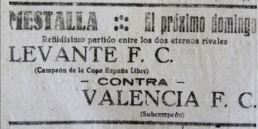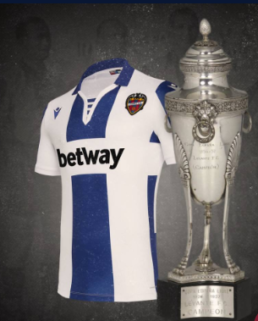Home / España Libre Cup / The difficult road to recognition
The difficult road to recognition
There was a time when everything was still to be discovered. The third millennium was beginning. The initial task was to narrow down the chronological space in which the competition took place. The Copa España Libre was played during the Civil War, but the initial research did not include the dates, the calendar, the participating teams or the sequence of the scheduled matches. It was necessary to recover the narrative that was once set in order to vindicate it. The war began in July 1936 and ended on 1 April 1939. It was obvious that we were moving during that interval, but the margins had to be narrowed even further in order to contextualise its movements rigorously and firmly. The story had yet to be codified. It seemed an exciting challenge.
The newspaper library acquired importance in this inaugural phase. The newspapers El Pueblo and Levante El Mercantil Valenciano maintained their mastheads during the infernal days of the Civil War. Their pages hid a great treasure trove of information offered from a multidisciplinary perspective. There was plenty of space for sport. The effervescence of the discipline of football became evident, banishing the widely spread myth that stressed the forced absence of football events during the war. The Super-Regional Championships, in the final months of 1936, served as a prologue to the Mediterranean League which brought together the clubs of Valencia and Catalonia in a double confrontation between January and April 1937. The Copa España Libre closed the football year. The footballing story was identical to that of the years immediately after the outbreak of the war. Three competitions were held in a calendar from October 1936 to June 1937. The idea, redundant though it may be, is transcendent for understanding the meaning of the competition. Everything was punctually reflected in the Valencian press.
The spring of 1937 was full of information about the Copa España Libre. And the information would increase exponentially with the news from El Mundo Deportivo. It is a maxim of history; it is not convenient to bet on inexorable dogmas. Everything can be rewritten. History is a discipline that is alive. Nor should it be buried. History can be transformed. The digitalisation of this Catalan media was decisive in increasing the flow of information coming from the Copa de España Libre. The order was determined. The fragments of a story that seemed unsolvable were beginning to embed themselves to form a narrative.

Needless to say, the format was original. Valencia, Levante, Girona and Espanyol would compete in a two-legged competition between June and July 1937. The top two teams in the standings would face the Grand Final on neutral territory. Levante and Valencia competed for glory in the Final in Sarrià on Sunday 18 July 1937. Levante, who fought with Gimnástico players, confirmed their supremacy with a goal by Nieto. The Copa de La España Libre was the property of Levante F.C. and as such rested in the display case in the institution’s Trophy Room in the Ciutat de València Stadium. The second action was to dust it off and show it to the Levante fans and the general public. The Copa España Libre was no longer a chimera but an illusion.
A tortuous process of recognition began. Towards the end of 2004, Izquierda Unida took an interest in the matter. Izquierda Unida urged the government to recognise the title by presenting a non-legislative proposal in the Congress of Deputies. In September 2007, the Education and Sports Commission of the Congress of Deputies unanimously approved a non-legislative proposal that urged the Royal Spanish Federation to recognise the Copa España Libre title won by Levante F.C. All parliamentary groups approved the initiative presented by IU-ICV. The Congress of Deputies de facto recognised the title won by Levante in July 1937. However, at the RFEF’s annual assembly held on 10 July 2009, the Spanish Federation agreed to reject the official status of the Copa España Libre. That setback did not reduce the propulsion of the Copa España Libre to ashes.

The trophy continued to sparkle to become part of the story that makes up the history of the club. The Copa España Libre was deeply rooted in the hearts of the club’s supporters. Little by little, this feat became part of the memory of the militant Levante fans. The adventure of the brave team members who achieved the feat took on a new look and feel. The previously fantasised images could be felt. La Copa es nostra’. The cry is heard louder and louder. The manifestation is evident of the meaning it presents. The democratic roots of the recognition of the trophy are difficult to question. The centenary of the Orriols neighbourhood society in 2009 served as a platform to vindicate its lineage and caste. Publications with the history of Levante as a thematic axis multiplied in that period of time. The Copa España Libre found reverberation to spread its content. The message caught on.
In May 2013, a delegation from the Levante Board of Directors, accompanied by Vicente Muñoz, president of the Valencian Football Federation, travelled to the Ciudad del Fútbol in Las Rozas to present Ángel María Villar, in his capacity as president of the RFEF, with a replica of the Copa España Libre, which has been displayed in the Football Museum since that date. In the summer of 2019, Levante opted for the recovery of the blue and white stripes as the second kit for the 2019-2020 season, activating the memory of the Copa España Libre. Levante honoured the memory of one of the most legendary episodes signed by the centenary institution.
The 110th anniversary of the founding of Levante U.D. served as a framework to legitimise once again the Granotas’ aspirations in the process of recognition of the Copa España Libre. After exhaustive work by the Historical Heritage area and the club’s legal office, Levante UD through the FFCV presented in November 2019 all the documentation that justifies this request with a battery of new arguments. Salvador Gomar, president of the Football Federation of the Valencian Community, handed in the request for official recognition of the Copa España Libre title, popularly known by the Levante fans as the Copa de la República, won by the Granota squad in 1937.